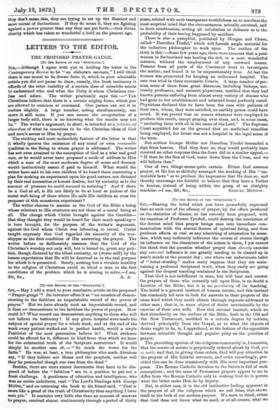[TO TRH EDITOR OF THE " SPECTATOR.")
Sin,—May I add a word to your conclusive article on the proposed " Prayer-gnage "? Its inventor offers it as "an occasion of demon- strating to the faithless an imperishable record of the power of prayer." But we have already such an imperishable record, and it does not demonstrate to the faithless the power of prayer. How could it? What record can demonstrate anything to those who will not believe its testimony ? If any given hospital were made the subject of special prayer for a whole week, and at the end of the week every patient walked out in perfect health, would a single Positivist of the next generation believe it? What evidence could be offered for it, different in kind from that which we have for the substantial truth of the Scripture narratives? It would simply be another case of, —" So much the worse for the facts." He was, at least, a true philosopher who made Abraham say, "If they believe not Moses and the prophets, neither will they be persuaded though one rose from the dead."
Besides, there are more recent documents that have to be dis- posed of before the "faithless" are in a position to put out a fresh challenge. A gentleman of education and intelligence, who was an entire unbeliever, read "The Lord's Dealings with George Muller," and on returning the book to his friend said, "That is more like a proof of the truth of Christianity than anything I have seen yet." It contains very little else than an account of answers to prayer, received almost continuously through a period of thirty
years, related with such transparent truthfulness as to convince the most sceptical mind that the circumstances actually occurred, and in their combination, setting all calculation at defiance as to the probability of their having happened by accident. There is also a pamphlet, published by Morgan and Chase, called "Dorothea Trudel," which will furnish ample material for the inductive philosopher to work upon. The outline of the story is this :—Some few years ago, there were rumours that a poor woman in Switzerland was healing the sick in a most wonderful manner, without the employment of any outward means. Persons from all parts of the Continent went to investigate the matter, and found it to be unquestionably true. At last the woman was prosecuted for keeping an unlicensed hospital. The case was tried in three successive Courts. A large number of per- sons, some of them from great distances, including bishops, uni- versity professors, and eminent physicians, testified that they had known persons suffering from almost every variety of disease who had gone to her establishment and returned home perfectly cured.
Physicians declared this to have been the case with patients of their own, whom, they were satisfied, no earthly power could have saved. It was proved that no means whatever were employed to produce this result, except praying over them, and, in some oases, "anointing them with oil in the name of the Lord." The Supreme Court acquitted her on the ground that no medicinal remedies being employed, her house was not a hospital in the legal sense of the term.
But neither George Miiller nor Dorothea 'rrudel demanded a sign from heaven. Had they done so, they would probably have received no other response than the Jews did to a similar appeal,— " If thou be the Son of God, come down from the Cross, and we will believe thee."
One of two things seems quite certain. Either God answers prayer, or He has so skilfully arranged the working of His "im- mutable laws" as to produce the impression that Ile does so, and thereby encourage the faithful to believe that they have a Father in heaven, instead of being within the grasp of an almighty


































 Previous page
Previous page